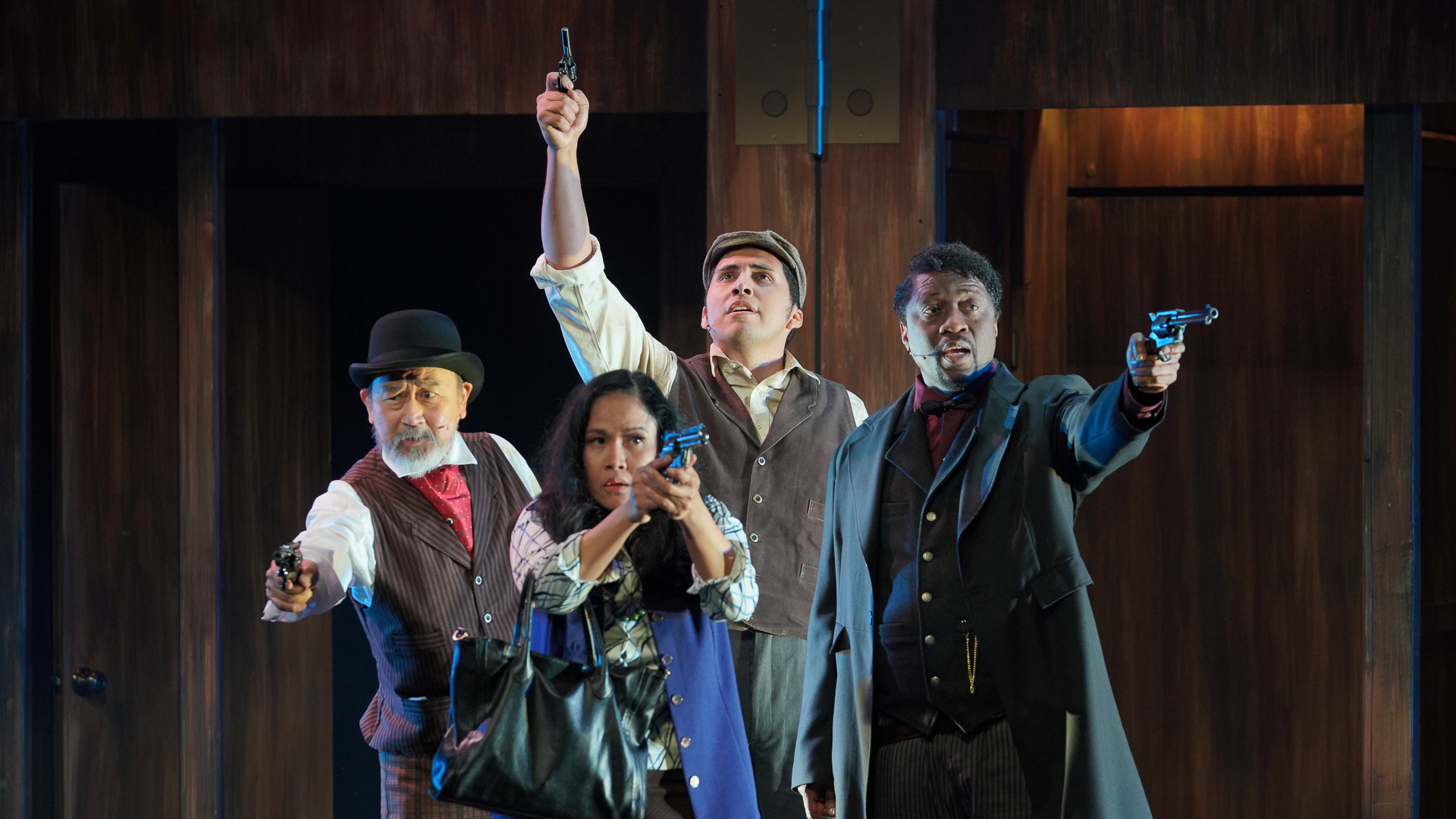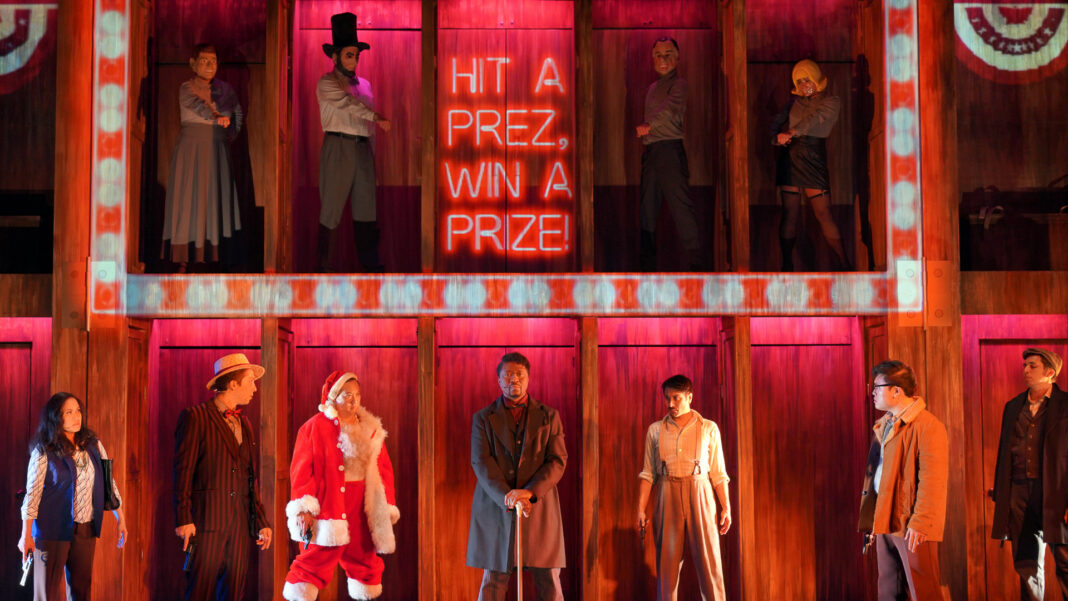
I first spoke to Snehal Desai, Producing Artistic Director of East West Players in Los Angeles, on February 21, 2020 about his then soon-to-open production of the Stephen Sondheim and John Weidman musical Assassins. We all know what happened. It took two years for Desai to finally be able to open the production.
So much has changed in the performing arts, in this country and around the world during that delay. Nonetheless Desai persevered.
Assassins, which opened this weekend, is a musical that depicts the men and women who either tried or succeeded in assassinating U.S. presidents. John Wilkes Booth, Lee Harvey Oswald, Lynette “Squeaky” Fromme and John Hinckley are amongst the characters appearing in a show Sondheim said* was, with the exception of one moment, “perfect. Immodest that may sound, but I’m ready to argue it with anybody.”
Just as new rehearsals were about to begin, I spoke again with Desai (who is directing a Sondheim musical for the first time). What follows are edited excerpts from our original conversation two years ago and our most recent one. His answers have been edited for length and clarity.
Let’s start with Sondheim’s own opinion of the show. Would you argue with him or do you think Assassins is a perfect musical?
It is such an interesting piece. What’s been fascinating is how we’ve been unpeeling the onion. The layers that are there go much deeper and further than any other musical I’ve worked on. Particularly the breadth and scope of the conversation it is looking to have. It’s looking to investigate the idea of the American dream and the disillusionment of it. It hits gun violence. It hits on politics, on history, celebrity. There are so many things intersecting and they do it seamlessly. It is a perfect piece in that it requires everyone who is a collaborator to step up and be at the top of their game.
With the two-year delay have you had time to consider what this show means today?
When we initially programed the play we were in the midst of an election. Donald Trump was president. It was just a very different world. I think the programing of the musical was to kind of confront the anxieties we were all having going into that election year in terms of what was happening in the world.
Now we’re in this moment where we’ve had this pandemic for two years. We’ve had January 6th which just had its one-year anniversary and we have a lot of rage and frustration. We’re also having lots of conversations about freedom and liberty and what we’re entitled to of the American dream. So those are the things that are resonating now in a more personal way. When we look at this now I’m looking at this group of assassins and it’s less about the individual acts, but more of who is this collective body of Americans who have to resort to this or feel that they have to resort to this violence to be seen and heard.
I’ve seen several productions of Assassins and it seems the biggest challenge any director faces is getting the tone of the show right.
I think it is the tonal shifts and the kind of radically move between worlds. The world of the play happens in this limbo space. The challenge is to define what that limbo space is and then what is the line that connects these acts to this limbo space. These individuals are pretty wild; they do crazy things. I have to do two things: not make it in the first moments so we write them off as crazy and weird. The other is not to forget the other side of the equation: the victims and the people who are affected by what happened.

When we spoke two years ago I asked you everybody has the right to be happy. You said they did. Obviously we’re going to have to come together for everyone to be happy. Do you have faith we can do that? Or is that something that just broke us?
I think there are questions of what it will take to bring us together. And I think what we know is that the things that bring the country together are a tragedy or war. Are we really at that moment where it’s going to take something so cataclysmic for us to to come together? Or are there other ways that we can find to bridge the divides that we’re in? Everyone has the right to be happy, but it’s also the whole gauntlet and range of human emotions that you’re going to go through in life. It’s not binary, right? You’re not just happy or sad or happy or mad. And it’s not just when you’re happy you’re always happy. I think it’s how we work with each other, what community is and how resilient we are that’s going to play a really key role in how we come together.
East West Players has had considerable success putting on productions of Sondheim’s musicals. What would you like people to understand about the significance of who Stephen Sondheim was and how does Assassins represent that perspective?
I think the biggest thing we saw since his passing is just how generous an artist he was and as a human being. Lin-Manuel Miranda said, “Our living Shakespeare has passed.” That’s not an understatement when you dig into this work. It is complex, layered, thoughtful work on a level that no one else is doing and has done for a very long period.
These are musicals that endure and they’re weird tales. They are eerie and disturbing when you think about Assassins or Sweeney Todd, but they hit somehow about human experience in ways that really penetrate us. I think that is something we’re going to see. I think this piece perfectly encapsulates who he is and the complexity of who he was as a man and as an artist.
He has just been so supportive of the Asian-American artistic community. We have folks like Gedde Watanabe, who was in the original Pacific Overtures, in this production. So it just feels like a very fitting tribute and bookend to to his legacy and connection with us.
Assassins continues at East West Players through March 20th. For tickets and more information, please go here.
Main photo: The cast of Assassins (Photo by Steven Lam/Courtesy East West Players)
*This quote is taken from the Stephen Sondheim book Look, I Made a Hat: Collected Lyrics (1981-2011)











